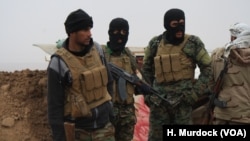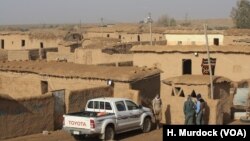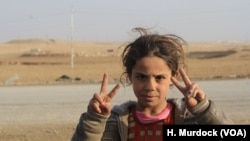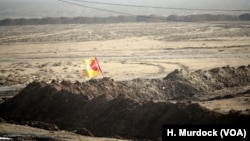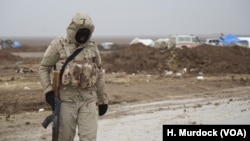“When Iraqi forces closed in, IS (Islamic State) militants told us Shia soldiers would murder us and rape our women,” said Fatehi Mohammad, a 64-year-old farmer in a remote desert village in Iraq’s northwestern Nineveh province.
Before IS took over his village of Bashmana, there were neither military forces nor minority citizens of any kind in the tiny Sunni enclave, so the villagers had no reason to doubt the IS warnings. “But we told them, we would stay in our home or die,” Mohammad said.
Some families retreated with the militants, but most remained as IS fled to another, more militarized village, he added.
“The first day we were liberated, the Iraqi Army brought biscuits and water to the children,” Mohammad continued, describing the re-capture of his village by Iraqi forces nearly two months ago. “The next day the Hashd Shaabi came in with food and cooking oil.”
Hashd Shaabi, or Popular Mobilization Units, is the local term for Iraq’s Shia militias, a label soldiers often resent, saying they are neither informal militias nor solely Shia. The units were established as an official government entity last month and have Sunnis, Christians and other minorities making up more than 30 percent of their ranks, according to Ammar Almusawee, a Hashd Shaabi spokesperson.
‘Stay in your homes’
Hashd Shaabi officials also insist they are firmly allied with the Iraqi Army, Kurdish peshmerga forces and the international coalition against IS militants. In the past two months, Hashd Shaabi forces have recaptured more than 80 villages and cut IS' main supply and escape routes, according to commanders.
“We believe in what we are doing,” added Almusawee, who said IS “wants us to go back to sectarian violence.”
Despite their initial defiance, Mohammad said, the IS warnings preyed on the minds of some of the villagers, who told the Hashd Shaabi militiamen they wanted to leave the village.
“Hashd Shaabi soldiers told us, ‘It’s okay, stay in your homes’ and then provided us with food and medicine,” he said.
Nearly two months later, Hashd Shaabi flags flutter at the entrance to Bashmana while, on the main road nearby, small groups of children wave and flash victory signs at passing Hashd Shaabi vehicles.
Task ahead
Winning over villagers' hearts, however, is a small task compared to the next challenge for the Hashd Shaabi forces. They have been tasked to lead the charge toward Tal Afar, a northwestern city strategically located between Mosul and the Syrian border, where IS is expected to put up fierce resistance.
The Tal Afar airport is already held by Hashd Shaabi, and fighters have gradually closed in on the city since the operation to re-take Mosul began in mid-October.
“Tal Afar is between Mosul and Syria,” said Sheikh Kareem al-Kharkani, a Hashd Shaabi brigade commander. “The liberation of Tal Afar will mean Islamic State in Mosul is finished.”
But the battle for Tal Afar may be long and arduous as local families and civilians forced to retreat with the militants are expected to be used as human shields, says al-Kharkani.
“We, as Iraq forces, use airplanes and mortars,” explains al-Kharkani. “Because IS in Tal Afar uses civilians as shields we can’t use our heavy weapons. We are asking civilians to flee the city any way they can.”
Winter delays
In recent days, some operations on the Western front have halted as forces contend with winter in the desert, where the dusty terrain has turned into vast fields of cold mud.
However the weather has not deterred the extremists from attacking their lines with munitions-laden cars. Several soldiers were wounded in the past week in attacks involving at least eight car bombs.
“We fought with them and the militants ran away,” said 25-year-old Mohaned, a Hashd Shaabi soldier stationed on top of an earthen berm that extends out of eyesight.
Witnesses say the battle lasted for hours, with heavy fire coming from both sides. But this fight, soldiers say, was small compared to the battles behind and in front of them.
“I’m willing to sacrifice anything,” said Morthana, another soldier outside a Hashd Shaabi base. “Not just for Shia, but for everyone.”
